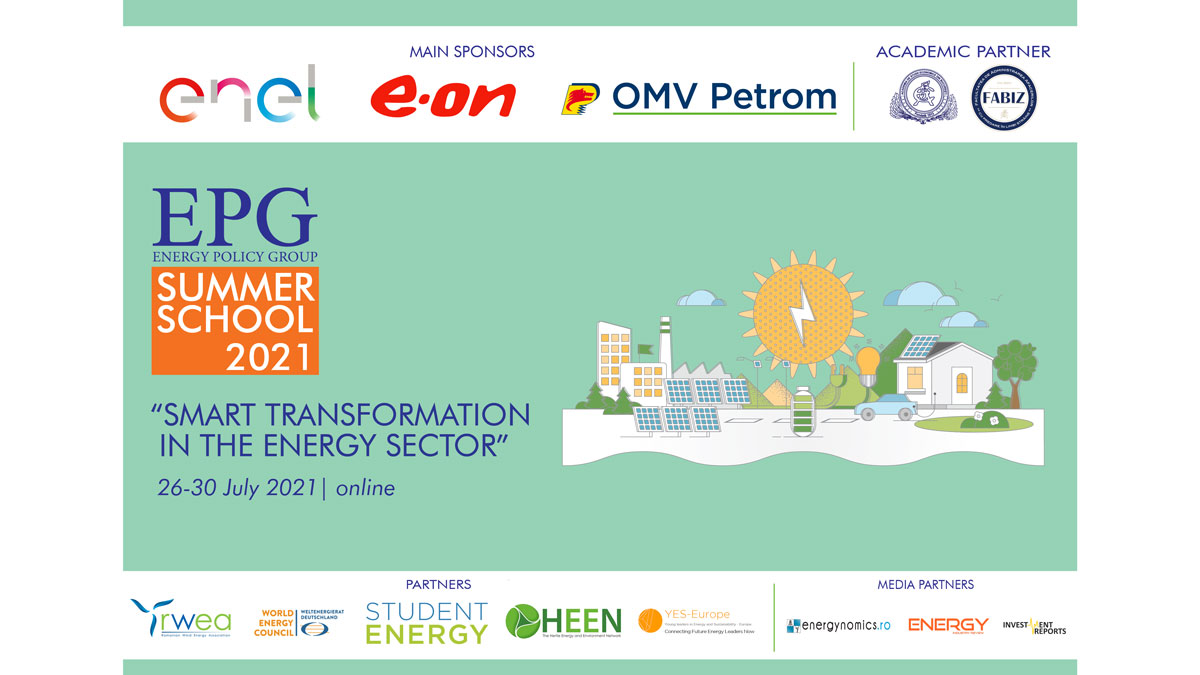Energy Policy Group’s Summer School: Smart Transformation in the Energy Sector

The fourth edition of Energy Policy Group’s Summer School, Smart Transformation in the Energy Sector, took place between 26 – 30 July. Due to the special conditions regarding travelling and in-person meetings that persist this year too because of the COVID-19 pandemic, EPG Summer School was organized exclusively online.
Reuniting 14 participants from Romania and five different countries with experienced and reputed speakers, the 5-day program was devoted to decarbonization initiatives with renewables at the centre of the transition to a less carbon-intensive and sustainable energy system.
The summer school is one of EPG’s flagship learning programs designed for students and professionals at the start of their career to offer them an in-depth knowledge about the energy sector’s fundamentals, a better understanding of the global energy trends, as well as the opportunities and challenges that come along. At the same time, the EPG Summer School is a great opportunity for students and young professionals all over the world to interact, debate and get together in order to build a sense of community.
This year’s edition touched upon how investments and financial flows consistent with a pathway towards low greenhouse gas emissions and climate-resilient development can be fostered through the economic recovery packages. Such decisions will shape economic and energy infrastructure for decades to come and will almost certainly determine whether the world has a chance of meeting its long-term energy and climate goals. Against this background, special attention had been given to digitalization and smart technologies as well as to understanding the potential of energy efficiency to enable a secure and sustainable energy system while delivering environmental and social benefits.
Scientifically attested and quantified, climate change is our reality. Even though the correlation between climate emissions and climate effects is not linear, adaptation should be at the cornerstone of future politics. In the pursuit of a sustainable environment, among the most disputed topics during Summer School were the impact of Fit for 55 legislative package and how it will transform the geopolitics, the role of hydrogen for key industries, and also the decarbonization journey from Kyoto Protocol (1998) to Paris Agreement (2015) and European Green Deal (2019).
Due to its content and structure, the program allowed its attendees to understand the energy sector in its full complexity and provided them a platform of interaction and networking. Once again, EPG added a significant piece to our community thanks to an outstanding group of participants engaged and dedicated to this common goal of attaining a smart energy transformation.
The Energy Policy Group (EPG) is a non-profit, Bucharest-based independent think-tank specializing in energy and climate policy, market analytics and energy strategy, grounded in February 2014. EPG’s regional focus is Southeast Europe. Its work, though, is informed by wider trends and processes at global and EU levels. EPG is committed to promoting long-term decarbonization policies and actions across all economic domains, with focus on the energy sector. They seek to facilitate objective and informed dialogue between decision-makers and a broad array of stakeholders.
EPG’s publications are freely available on https://www.enpg.ro/


